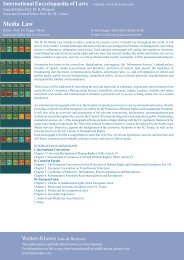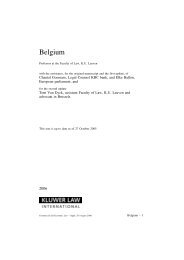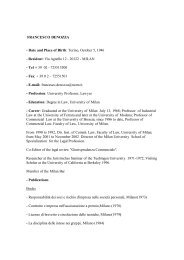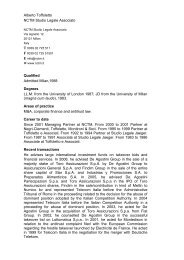USA - International Encyclopaedia of Laws
USA - International Encyclopaedia of Laws
USA - International Encyclopaedia of Laws
You also want an ePaper? Increase the reach of your titles
YUMPU automatically turns print PDFs into web optimized ePapers that Google loves.
130–134Chapter 3. The Legislature§1. THE ORGAN OF STATE130. There is no separate organ <strong>of</strong> state for the legislative branch. SeeChapter 2 above.§2. LEGAL STATUS131. The legislative branch, pursuant to the constitutions <strong>of</strong> the Americanstates, has an independent and co-equal status with the other two branches. Most<strong>of</strong> the state constitutions state that the Legislature shall be the judge <strong>of</strong> thequalifications <strong>of</strong> its members, and that members are immune from criminalcharges or civil liability for statements or actions made in connection with theirlegislative deliberations (the so-called ‘speech and debate clause’).§3. COMPETENCE132. The state legislative branch was the repository <strong>of</strong> the lion’s share <strong>of</strong>governmental power in the state constitutions <strong>of</strong> the founding decade before1800. The Framers <strong>of</strong> the federal Constitution, therefore, had extensive experiencewith the theory and practice <strong>of</strong> legislative power under state constitutionsbefore 1787. Bringing the other two branches to some form <strong>of</strong> parity, or at leastbringing them closer to being ‘co-equal’ would continue to occupy stateconstitutional Framers for at least the next century.133. More so than either the executive or judicial branches, the legislativebranch is different at the state level from its federal counterpart, the Congress.State legislative power is ‘plenary,’ whereas federal legislative power isspecifically enumerated. Plenary power is the residual, unlimited legislativepower. This basic distinction is somewhat oversimplified because state constitutionsalso do contain authorizations for the legislature to act. Still, however, itis this basic distinction that led to the observation that the most importantquestions <strong>of</strong> judicial interpretation <strong>of</strong> the federal Constitution have to do withimplied powers, while at the state level implied limitations are most important.134. These prospectives lead to the important, and powerful presumption<strong>of</strong> constitutionality for statutes enacted by the state legislature. Judicial deferenceConstitutional Law – Suppl. 34 (October 1999) <strong>USA</strong> (Sub-national) – 57
















